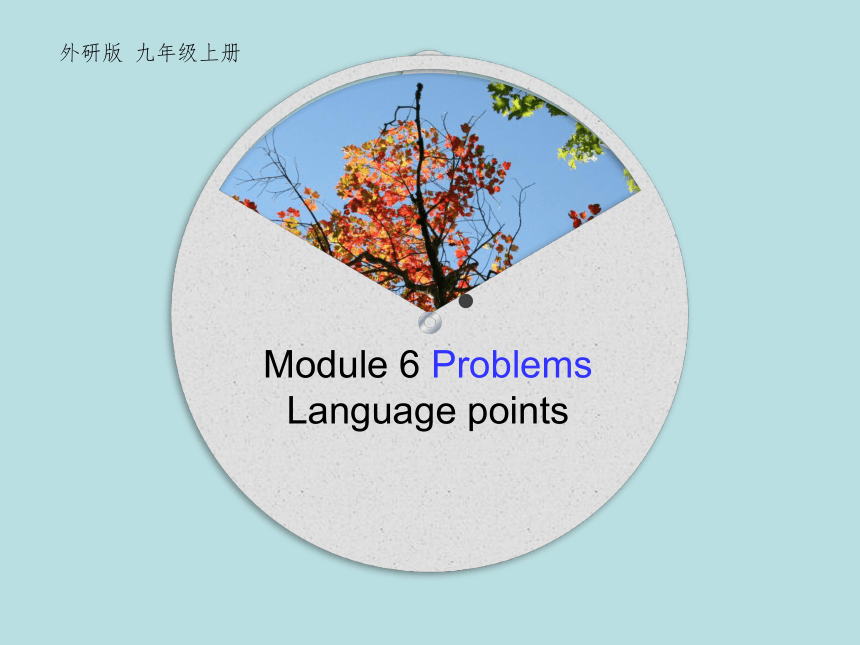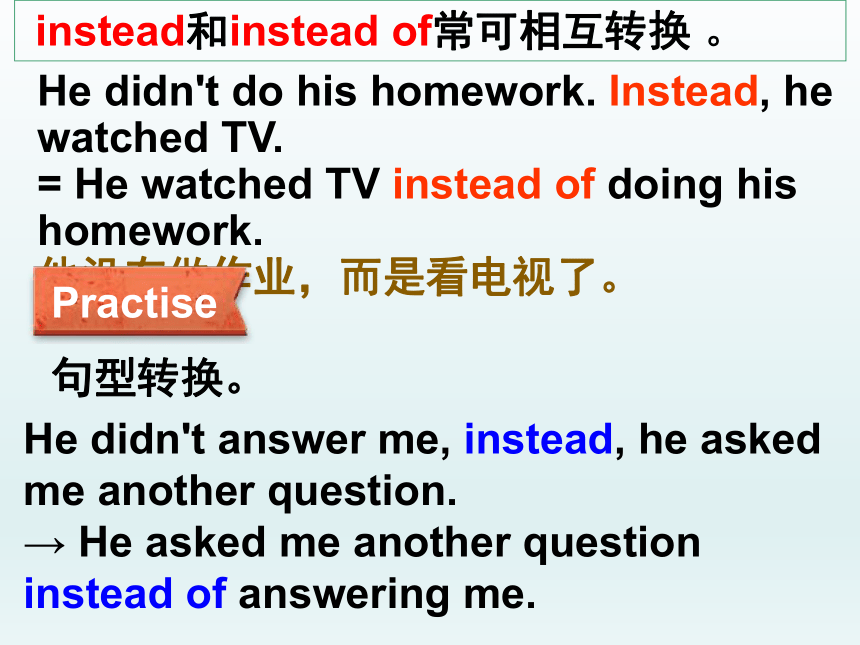外研版九年级上册Module 6 Problems Language points课件(共23张PPT)
文档属性
| 名称 | 外研版九年级上册Module 6 Problems Language points课件(共23张PPT) |  | |
| 格式 | pptx | ||
| 文件大小 | 805.6KB | ||
| 资源类型 | 教案 | ||
| 版本资源 | 外研版 | ||
| 科目 | 英语 | ||
| 更新时间 | 2022-09-21 11:22:16 | ||
图片预览









文档简介
(共23张PPT)
外研版 九年级上册
Module 6 Problems
Language points
1. I want you to get into the habit of doing your homework as soon as you come home from school.
我想让你养成一放学回家就做家庭作业的
习惯。
get into the habit of doing sth. 养成……习惯
① You ought to get into the habit of planning your work at the beginning of each week.
你应该养成每周伊始就安排好工作的习惯。
② Don't get into the habit of eating too much.
不要养成吃太多的习惯。
Unit 1
Language points
habit还能和其他动词搭配,表达不同的意思。
① She has a habit of taking a nap after lunch.
她有午饭后睡觉的习惯。
② Jeff was in the habit of taking a walk after dinner.
杰夫习惯于晚饭后散步。
③ I'm trying to break the habit of staying up too late.
我正试图改掉熬夜的习惯。
as soon as意为“一……就……”,其引导的从句通常用一般现在时表将来。
① I'll write to you as soon as I get there.
我一到那就给你写信。
② I will tell him the news as soon as he comes back。
他一回来我就告诉他这个消息。
2. That's a shame.
It's a shame. / That's a shame. / What a shame!用在口语中,表示“真遗憾。/多可惜啊!”
- Tim says he can't come tonight.
- Oh, that's a shame!
—蒂姆说他今晚不能来了。
—哦, 太遗憾了!
shame: n. 遗憾;可惜
It's a (great/real) shame that the concert had to be cancelled.
音乐会被迫取消,真是(很)遗憾。
真遗憾。
3. If you do all these other things instead of your homework, you won't have time to study.
如果你不做作业而做其他事情,你将没有时间学习。
instead of:短语介词,除了“代替”的意思,还可表示“而不是”,通常用于句中,后面可接名词、代词或动名词等。
① You can go instead of me, if you want.
如果你愿意,你可以代替我去。
② He wanted to decide for himself instead of blindly following others' advice.
他想自己拿主意,而不是盲目听从其他人的意见。
① There is no coffee. Would you like a cup of tea instead
没有咖啡,来杯茶怎么样?
② She didn't answer me. Instead, she asked me another question.
她没有回答我,反而问了我另外一个问题。
instead意为“代替”,作副词,通常位于句尾。如位于句首时常用逗号与后面隔开。instead 在顺接句子中作“代替”讲,而在转折(或逆转)句子中作“然而;反而”讲。
instead和instead of常可相互转换 。
He didn't do his homework. Instead, he watched TV.
= He watched TV instead of doing his homework.
他没有做作业,而是看电视了。
He didn't answer me, instead, he asked me another question.
→ He asked me another question instead of answering me.
Practise
句型转换。
4. No deal, Tony.
deal在这里的意思是“协议”。在口语中,我们常用deal表示“达成协议”的意思。 No deal表示不同意,可译成“这不行”。
① - You wash the car and I'll let you use it tonight.
- Deal!
—你洗车,我今晚就让你用车。
—说定了!
② We'll consider any suggestion to make a deal.
我们将会考虑能达成协议的任何建议。
托尼,这不行。
5. You should consider what the most important thing is.
你要权衡哪件事情最重要。
consider有“考虑”、 “斟酌 ”之意,后可接名词、代词、动名词或者宾语从句。当动词不定式前有wh-时(如:what, where, when等),也可与 consider连用。
① You'd better consider how to get there.
你最好考虑下如何去那儿。
② Have you considered what to do next
你考虑过接下来做什么吗?
We consider him a good manager.
= We consider him as a good manager.
= We consider him to be a good manager.
我们认为他是一个好经理。
consider还有“认为 ”之意,当表示“视……为……”时,可用 “consider + sb / sth + (as / to be +) …”结构。
汉译英:
请花时间考虑一下这个问题。
_____________________________________
Please take time to consider this problem.
Practise
6. I don't want you to fail your exams.
我不想让你考试不及格。
fail 一般用作动词,当它表示“不及格”之意时,既可作及物动词,也可作不及物动词。
① He failed his driving test.
他驾驶执照考试不及格。
② What will you do if you fail
如果你考试失败打算干什么?
fail还可表示“未能……”之意,后接动词不定式作宾语。
She failed to get into art college.
她未能进入艺术学院。
养成……的习惯
代替,而不是
真可惜!
这不行。
考虑,衡量
考试不及格
Review
get into the habit of
instead of
What/It's/That's a shame.
No deal.
consider
fail the exam
1. The reason is that he thinks something will go wrong if I play games on it.
原因是他认为我要是在电脑上玩游戏的话,电脑就会出毛病。
the reason is that… ……的原因是……
① She can't come tonight. The reason is that she must look after her sick mother.
今晚她不能来了,原因是她必须照顾生病的妈妈。
② My reason is that the cost is too high.
我的理由是费用太高了。
Unit 2
Language points
His television has gone wrong again.
他的电视又出毛病了。
go wrong :出毛病,出故障;出错
英译汉:
1. The reason is that he had developed a good habit.
__________________________________
2. Keep a cool head when things go wrong.
__________________________________
理由是他已经养成了一个好习惯。
出问题时要保持冷静的头脑。
Practise
2. Well, while my dad was out, we decided to try out David's game.
爸爸当时不在家,我们决定试一下戴维的游戏。
be out: 短时间内不在(家或办公室)
My parents are both out at the moment.
我父母目前都不在家。
try out: 试用;试
I want to try out the new car.
我想试试这辆新车。
3. He could no longer find the documents anywhere!
他再也找不到那些文件了!
no longer相当于not…any longer,意为“不再”。
① I could wait for him no longer.
= I could not wait for him any longer.
我不能再等他了。
② The house no longer belonged to him.
= The house didn't belong to him any longer.
这个房子不再属于他了。
4. …he will be angry with you, but at least you will show that you are honest.
……他会生你的气,但至少你能表明自己是诚实的。
be angry with sb.: 生某人的气
I shall be angry with you if you break the cup.
你要是打碎了杯子,我会生气的。
at least: 至少;起码
You’ll wait at least an hour.
你至少要等一个小时。
2. 你至少要花20分钟才能到那儿。
________________________________________________________________________
1. 因为我上课迟到了,史密斯先生生气了。
Mr Smith me because I was late for class.
was angry with
It will take you at least twenty minutes to get there.
Practise
5. You should apologise to your father.
你应该向你爸爸道歉。
① I apologise for being late.
我为迟到表示歉意。
② He apologised to the people who had been affected.
他向受到了影响的人道了歉。
③ Toby apologised to Linda for arriving late.
托比因迟到而向琳达道歉。
apologise: 道歉
apologise to sb 向某人道歉
apologise for (doing) sth 因(做)某事而道歉
pologise to sb for (doing) sth 因(做)某事而向某人道歉
6. If you offer to give up your pocket money, your father will realise that you are sorry.
如果你主动提出放弃你的零用钱,你爸爸会意识到你深怀歉意。
offer: 主动提出;自愿给予
① He offered some useful advice.
他提出了一些有益的建议。
②We offer free technical support.
我们提供免费的技术支持。
③The kids offered to do the dishes.
孩子们主动要求洗盘子。
1 ……的原因是……
2 出错,出故障
3 短时间内不在(家 )
4 试用
5 不再
6 至少
7 生某人的气
8 向某人道歉
9 主动提出;自愿给予
Review
1 The reason is that …
2 go wrong
3 be out
4 try out
5 no longer
6 at least
7 be angry with sb.
8 apologise to sb.
9 offer
THANK YOU!
外研版 九年级上册
Module 6 Problems
Language points
1. I want you to get into the habit of doing your homework as soon as you come home from school.
我想让你养成一放学回家就做家庭作业的
习惯。
get into the habit of doing sth. 养成……习惯
① You ought to get into the habit of planning your work at the beginning of each week.
你应该养成每周伊始就安排好工作的习惯。
② Don't get into the habit of eating too much.
不要养成吃太多的习惯。
Unit 1
Language points
habit还能和其他动词搭配,表达不同的意思。
① She has a habit of taking a nap after lunch.
她有午饭后睡觉的习惯。
② Jeff was in the habit of taking a walk after dinner.
杰夫习惯于晚饭后散步。
③ I'm trying to break the habit of staying up too late.
我正试图改掉熬夜的习惯。
as soon as意为“一……就……”,其引导的从句通常用一般现在时表将来。
① I'll write to you as soon as I get there.
我一到那就给你写信。
② I will tell him the news as soon as he comes back。
他一回来我就告诉他这个消息。
2. That's a shame.
It's a shame. / That's a shame. / What a shame!用在口语中,表示“真遗憾。/多可惜啊!”
- Tim says he can't come tonight.
- Oh, that's a shame!
—蒂姆说他今晚不能来了。
—哦, 太遗憾了!
shame: n. 遗憾;可惜
It's a (great/real) shame that the concert had to be cancelled.
音乐会被迫取消,真是(很)遗憾。
真遗憾。
3. If you do all these other things instead of your homework, you won't have time to study.
如果你不做作业而做其他事情,你将没有时间学习。
instead of:短语介词,除了“代替”的意思,还可表示“而不是”,通常用于句中,后面可接名词、代词或动名词等。
① You can go instead of me, if you want.
如果你愿意,你可以代替我去。
② He wanted to decide for himself instead of blindly following others' advice.
他想自己拿主意,而不是盲目听从其他人的意见。
① There is no coffee. Would you like a cup of tea instead
没有咖啡,来杯茶怎么样?
② She didn't answer me. Instead, she asked me another question.
她没有回答我,反而问了我另外一个问题。
instead意为“代替”,作副词,通常位于句尾。如位于句首时常用逗号与后面隔开。instead 在顺接句子中作“代替”讲,而在转折(或逆转)句子中作“然而;反而”讲。
instead和instead of常可相互转换 。
He didn't do his homework. Instead, he watched TV.
= He watched TV instead of doing his homework.
他没有做作业,而是看电视了。
He didn't answer me, instead, he asked me another question.
→ He asked me another question instead of answering me.
Practise
句型转换。
4. No deal, Tony.
deal在这里的意思是“协议”。在口语中,我们常用deal表示“达成协议”的意思。 No deal表示不同意,可译成“这不行”。
① - You wash the car and I'll let you use it tonight.
- Deal!
—你洗车,我今晚就让你用车。
—说定了!
② We'll consider any suggestion to make a deal.
我们将会考虑能达成协议的任何建议。
托尼,这不行。
5. You should consider what the most important thing is.
你要权衡哪件事情最重要。
consider有“考虑”、 “斟酌 ”之意,后可接名词、代词、动名词或者宾语从句。当动词不定式前有wh-时(如:what, where, when等),也可与 consider连用。
① You'd better consider how to get there.
你最好考虑下如何去那儿。
② Have you considered what to do next
你考虑过接下来做什么吗?
We consider him a good manager.
= We consider him as a good manager.
= We consider him to be a good manager.
我们认为他是一个好经理。
consider还有“认为 ”之意,当表示“视……为……”时,可用 “consider + sb / sth + (as / to be +) …”结构。
汉译英:
请花时间考虑一下这个问题。
_____________________________________
Please take time to consider this problem.
Practise
6. I don't want you to fail your exams.
我不想让你考试不及格。
fail 一般用作动词,当它表示“不及格”之意时,既可作及物动词,也可作不及物动词。
① He failed his driving test.
他驾驶执照考试不及格。
② What will you do if you fail
如果你考试失败打算干什么?
fail还可表示“未能……”之意,后接动词不定式作宾语。
She failed to get into art college.
她未能进入艺术学院。
养成……的习惯
代替,而不是
真可惜!
这不行。
考虑,衡量
考试不及格
Review
get into the habit of
instead of
What/It's/That's a shame.
No deal.
consider
fail the exam
1. The reason is that he thinks something will go wrong if I play games on it.
原因是他认为我要是在电脑上玩游戏的话,电脑就会出毛病。
the reason is that… ……的原因是……
① She can't come tonight. The reason is that she must look after her sick mother.
今晚她不能来了,原因是她必须照顾生病的妈妈。
② My reason is that the cost is too high.
我的理由是费用太高了。
Unit 2
Language points
His television has gone wrong again.
他的电视又出毛病了。
go wrong :出毛病,出故障;出错
英译汉:
1. The reason is that he had developed a good habit.
__________________________________
2. Keep a cool head when things go wrong.
__________________________________
理由是他已经养成了一个好习惯。
出问题时要保持冷静的头脑。
Practise
2. Well, while my dad was out, we decided to try out David's game.
爸爸当时不在家,我们决定试一下戴维的游戏。
be out: 短时间内不在(家或办公室)
My parents are both out at the moment.
我父母目前都不在家。
try out: 试用;试
I want to try out the new car.
我想试试这辆新车。
3. He could no longer find the documents anywhere!
他再也找不到那些文件了!
no longer相当于not…any longer,意为“不再”。
① I could wait for him no longer.
= I could not wait for him any longer.
我不能再等他了。
② The house no longer belonged to him.
= The house didn't belong to him any longer.
这个房子不再属于他了。
4. …he will be angry with you, but at least you will show that you are honest.
……他会生你的气,但至少你能表明自己是诚实的。
be angry with sb.: 生某人的气
I shall be angry with you if you break the cup.
你要是打碎了杯子,我会生气的。
at least: 至少;起码
You’ll wait at least an hour.
你至少要等一个小时。
2. 你至少要花20分钟才能到那儿。
________________________________________________________________________
1. 因为我上课迟到了,史密斯先生生气了。
Mr Smith me because I was late for class.
was angry with
It will take you at least twenty minutes to get there.
Practise
5. You should apologise to your father.
你应该向你爸爸道歉。
① I apologise for being late.
我为迟到表示歉意。
② He apologised to the people who had been affected.
他向受到了影响的人道了歉。
③ Toby apologised to Linda for arriving late.
托比因迟到而向琳达道歉。
apologise: 道歉
apologise to sb 向某人道歉
apologise for (doing) sth 因(做)某事而道歉
pologise to sb for (doing) sth 因(做)某事而向某人道歉
6. If you offer to give up your pocket money, your father will realise that you are sorry.
如果你主动提出放弃你的零用钱,你爸爸会意识到你深怀歉意。
offer: 主动提出;自愿给予
① He offered some useful advice.
他提出了一些有益的建议。
②We offer free technical support.
我们提供免费的技术支持。
③The kids offered to do the dishes.
孩子们主动要求洗盘子。
1 ……的原因是……
2 出错,出故障
3 短时间内不在(家 )
4 试用
5 不再
6 至少
7 生某人的气
8 向某人道歉
9 主动提出;自愿给予
Review
1 The reason is that …
2 go wrong
3 be out
4 try out
5 no longer
6 at least
7 be angry with sb.
8 apologise to sb.
9 offer
THANK YOU!
同课章节目录
- Module 1 Wonders of the world
- Unit 1 It's more than 2,000 years old.
- Unit 2 The Grand Canyon was not just big.
- Unit 3 Language in use
- Module 2 Public holidays
- Unit 1 My family always go somewhere interesting a
- Unit 2 We have celebrated the festival since the f
- Unit 3 Language in use
- Module 3 Heroes
- Unit 1 She trained hard,so she became a great play
- Unit 2There were few doctors, so he had to work ve
- Unit 3 Language in use
- Module 4 Home alone
- Unit 1 I can look after myself, although it won’t
- Unit 2 I became so bored with their orders that I
- Unit 3 Language in use
- Module 5 Museums
- Unit 1 Don't cross that rope!
- Unit 2 If you ever go to London, make sure you vis
- Unit 3 Language in use
- Module 6 Problems
- Unit 1 If I start after dinner, I'll finish it be
- Unit 2 If you tell him the truth now, you will sho
- Unit 3 Language in use
- Revision Module A
- Module 7 Great books
- Unit 1 We're still influenced by Confucius's idea
- Unit 2 It is still read and loved.
- Unit 3 Language in use
- Module 8 Sports life
- Unit 1 Daming wasn't chosen for the team last time
- Unit 2 He was invited to competitions around the w
- Unit 3 Language in use
- Module 9 Great inventions
- Unit 1 Will computers be used more than books in t
- Unit 2 Will books be replaced by the Internet?
- Unit 3 Language in use
- Module 10 Australia
- Unit 1 I have some photos that I took in Australia
- Unit 2 The game that they like most is Australian
- Unit 3 Language in use
- Module 11 Photos
- Unit 1 He's the boy who won the photo competition
- Unit 2 The photo which we liked best was taken by
- Unit 3 Language in use
- Module 12 Save our world
- Unit 1 If everyone starts to do something, the wor
- Unit 2 Repeat these three words daily: reduce, reu
- Unit 3 Language in use
- Revision Module B
